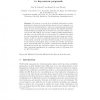33 search results - page 6 / 7 » Public-Key Encryption with Lazy Parties |
ACNS
2010
Springer
13 years 8 months ago
2010
Springer
Verifiably encrypted signature schemes (VES) allow a signer to encrypt his or her signature under the public key of a trusted third party, while maintaining public signature verifi...
ACMICEC
2003
ACM
13 years 10 months ago
2003
ACM
A multi-agent marketplace, MAGNET (Multi AGent Negotiation Testbed), is a promising solution to conduct online combinatorial auctions. The trust model of MAGNET is somewhat diffe...
SP
1997
IEEE
13 years 8 months ago
1997
IEEE
Encrypted Key Exchange (EKE) [1, 2] allows two parties sharing a password to exchange authenticated information over an insecure network by using a combination of public and secre...
EUROCRYPT
1997
Springer
13 years 9 months ago
1997
Springer
We propose a concept for a worldwide information security infrastructure that protects law-abiding citizens, but not criminals, even if the latter use it fraudulently (i.e. when no...
WS
2005
ACM
13 years 11 months ago
2005
ACM
Mobile ad hoc networks (MANETs) offer communication over a shared wireless channel without any pre-existing infrastructure. Forming peer-to-peer security associations in MANETs i...


